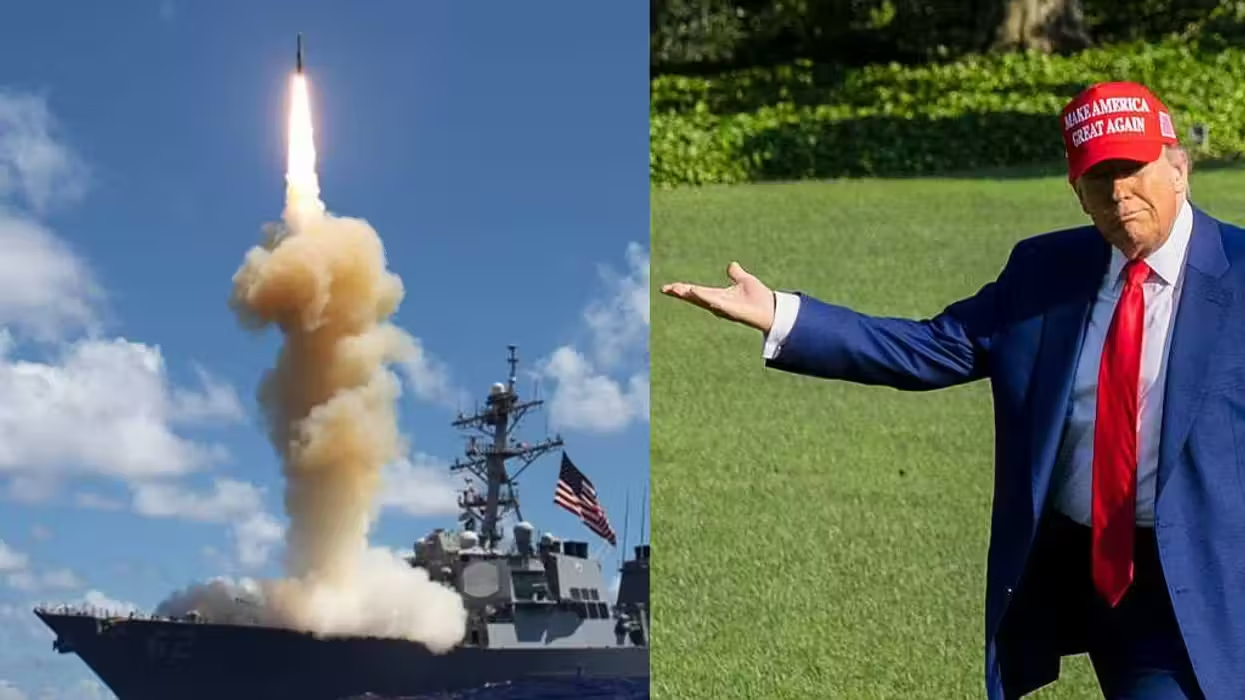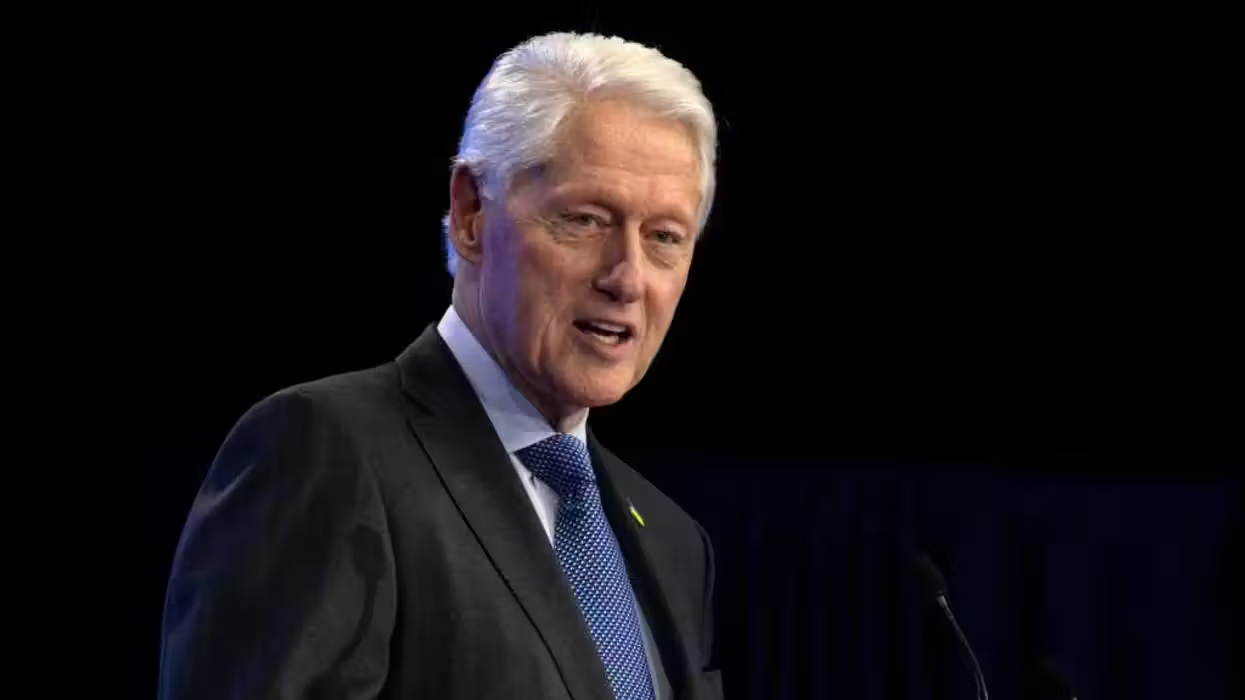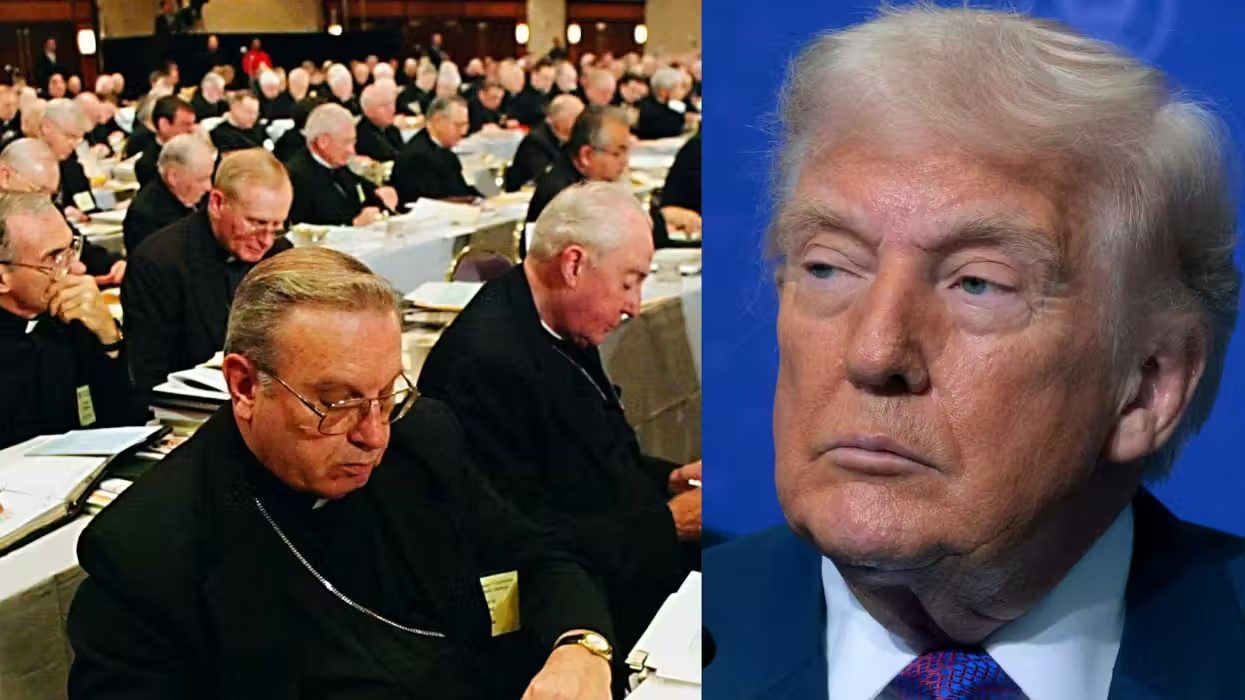
© 2026 Blaze Media LLC. All rights reserved.
While the world focuses elsewhere, is China tightening its grip on Hong Kong?
September 05, 2014
And what Ronald Reagan told us about the worth of paper treaties.
Recently we have been pouring over "Reagan, In His Own Hand: The Writings of Ronald Reagan that Reveal His Revolutionary Vision for America," a collection of numerous speeches written by Reagan primarily in the years leading up to his 1980 run for the presidency.
One such speech on treaties -- and how frequently throughout history they have been broken -- is ringing particularly timely, not just in light of the ongoing Iranian nuclear negotiations or Russia's eastward march, but in context of two recent stories out of Hong Kong, where as the New York Times writes, "Pro-democracy advocates...are girding for what some predict will be a tense final showdown with the Chinese government over whether Beijing will permit genuine democracy...in the former British colony."
 Pro-democracy lawmakers display placards against Li Fei, deputy secretary general of the National People’s Congress' Standing Committee, during a briefing session in Hong Kong Monday, September 1, 2014. Hong Kong pro-democracy legislators have disrupted the Beijing official’s speech as he sought to explain a decision to tightly limit voting reforms for the southern Chinese financial hub. The placards read "Break a promise" and "Shameful." (Image Source: AP Photo/Kin Cheung)
Pro-democracy lawmakers display placards against Li Fei, deputy secretary general of the National People’s Congress' Standing Committee, during a briefing session in Hong Kong Monday, September 1, 2014. Hong Kong pro-democracy legislators have disrupted the Beijing official’s speech as he sought to explain a decision to tightly limit voting reforms for the southern Chinese financial hub. The placards read "Break a promise" and "Shameful." (Image Source: AP Photo/Kin Cheung)
In the first story, Michael Auslin of National Review tells us:
[J]ust 17 years after the British pulled down their flag in Hong Kong, Beijing has revealed its true intentions and the worthlessness of its international agreements. Last week, China's rubberstamp parliament, the National People's Congress, overturned the core of the 1984 agreement by reneging on its promise that the 2017 election for Hong Kong’s chief executive will be a free and open affair. Instead, Hong Kong voters will be able to choose only from candidates approved by a Beijing-dominated nominating committee, and only two or three will be allowed on the ballot.
The 1984 Sino-British Joint Declaration between China's prime minister Zhao Zhiyang and British prime minister Margaret Thatcher was to ensure "the famous "one country, two systems" formulation in which Hong Kong's way of life was guaranteed to remain inviolable for 50 years, until 2047. Central to the agreement was an assurance by China that Hong Kong (now to be a special administrative region) would have a high degree of autonomy, except in foreign and defense affairs."
Under the 1984 agreement, the basic rules of governance in Hong Kong that were to take effect in 1997 when the territory was to be transferred to China were enumerated in the constitution of Hong Kong, known as Hong Kong Basic Law, which states explicitly in Chapter 1, Article 5:
The socialist system and policies shall not be practised in the Hong Kong Special Administrative Region, and the previous capitalist system and way of life shall remain unchanged for 50 years.
It is hard to see how Chinese policy comports with the Hong Kong Basic Law.
In the second story of China's creeping influence in Hong Kong, Bill McGurn of the New York Post reports that Chinese authorities have recently raided the homes of two friends and a local legislator, as McGurn puts it for the "high crime of believing that Hong Kong ought to be a society of, by and for the people." He tells us, ominously:
Just before he died, newspaperman Tsang Ki-fan put it this way: "This is the only Chinese society that, for a brief span of 100 years, lived through an ideal never realized at any time in the history of Chinese societies — a time when no man had to live in fear of the midnight knock on the door."These words come back to me as Mark Simon, an American expat working in Hong Kong, calls to report that authorities had raided his apartment and seized a computer from his 10-year-old daughter. The same day, the same police raided the homes of his boss, media owner Jimmy Lai, and a local legislator, Lee Cheuk-yan.
The knock has come.
 Pro-democracy activists clash with police outside the hotel where top Communist Party official Li Fei was staying in Hong Kong on September 1, 2014. (Image Source: Reuters/The Sydney Morning Herald)
Pro-democracy activists clash with police outside the hotel where top Communist Party official Li Fei was staying in Hong Kong on September 1, 2014. (Image Source: Reuters/The Sydney Morning Herald)
McGurn argues that these men are being persecuted for having supported democratic political principles through "financial contributions, with public advocacy and with moral courage." He believes that such Chinese actions evince
the shabby ethos Beijing is imposing on Hong Kong. The raiding authority was the Independent Commission Against Corruption, or ICAC. So even if the three men are never arrested and don’t go to jail, the authorities have achieved their aim: to smear them, and to intimidate anyone who might be thinking of following their example.
Echoing Auslin's argument, McGurn continues:
It wasn't supposed to turn out this way. Back when Margaret Thatcher's government signed Hong Kong over, the basic promise was that China would get Hong Kong but Hong Kong would get democracy.The idea was not implausible, given the remarkable openings in China.
Then again, events since remind us that the essence of communism has never been Marxist economics: It's power and control and the lie.
This brings us back to Reagan. In a March 13, 1978 radio address titled "Treaties," Reagan writes:
Laurence Beilenson, a distinguished Calif. lawyer & scholar authored a book ["The Treaty Trap"] a few years ago that is quite unique. In fact it is, so far as I know, the only history of treaties and the observance and lack of observance of same--dating all the way back through biblical times. One thing stands out sharply--no nation which put it's faith in treaties but let it's mil. hardware deteriorate stayed around very long.The very nature of treaties is such that more often then not they must be written in 2 languages. The result is that regardless of the good will of the signatories the different meanings of words when translated from one language to another can make for misunderstandings.
Let's take an agreement which while not a formal treaty was still a joint communiqué between the heads of state of 2 nations enunciating a policy. I'm talking about the Shanghai communique that climaxed the visit of an American Pres. to the Peoples Republic of China a few years ago. In looking at it one is apt to be more confused than enlightened.
The Chinese made a statement with regard to our long time ally the Free Repub. of China on Taiwan, that it, quote "opposes the creation of 2 Chinas, an independent Taiwan or a separate solution" unquote. The U.S. in turn says quote "that it does not challenge this view." To Americans this was plain English that meant we neither agreed nor disagreed--we simply avoided the issue.
Unfortunately it is not that easy & simple. The Chinese translation of the phrase, "does not challenge" is taken to mean that because we make no objection we agree with Chinas position. Then there is a sentence to the effect that there should be a peaceful solution to the problem of Taiwan. We would interpret that to mean that Peking won't launch an attack or try to conquer Taiwan by force of arms. Again Peking denies that this language binds them to seek a peaceful solution.We have an example in the Panama Canal treaties that came to light early in the Sen. debate. Senators were proposing amendments to the treaties which apparently didn't disturb the Panamanians--until the Panamanians realized what we meant by amendment. To us an amendment is a clause as binding as the original treaty--as witness amendments to our constitution.
To them "enmienda" (amendment) is just a minor change in wording--alright if it is just included in an existing clause but definitely a no-no if it's added as an additional paragraph. Then it becomes serious business.
As we approach the Salt II talks with Russia we should keep in mind that Russian is a far more complicated language than Spanish. Besides which the Russians don't keep their word even when they understand the meaning.
All of this might be intuitive to a hardened foreign policy realist. Nevertheless, the question might bear asking, is it intuitive to the American people, their leaders, and the free world more broadly, today?
Note: The link to the book in this post will give you an option to elect to donate a percentage of the proceeds from the sale to a charity of your choice. Mercury One, the charity founded by TheBlaze’s Glenn Beck, is one of the options. Donations to Mercury One go towards efforts such as disaster relief, support for education, support for Israel and support for veterans and our military. You can read more about Amazon Smile and Mercury One here.
–
Follow Ben Weingarten (@bhweingarten) and TheBlazeBooks on Twitter and Facebook.
You can find all of our Blaze Books interviews on Soundcloud and Stitcher, and subscribe to our podcast automatically via iTunes.
Want to leave a tip?
We answer to you. Help keep our content free of advertisers and big tech censorship by leaving a tip today.
Want to join the conversation?
Already a subscriber?
Ben Weingarten is a writer, commentator, and editor at large at RealClearInvestigations. He is a senior contributor at the Federalist and writes columns for Newsweek and the Epoch Times.
Ben Weingarten
Ben Weingarten is a writer, commentator, and editor at large at RealClearInvestigations. He is a senior contributor at the Federalist and writes columns for Newsweek and the Epoch Times.
more stories
Sign up for the Blaze newsletter
By signing up, you agree to our Privacy Policy and Terms of Use, and agree to receive content that may sometimes include advertisements. You may opt out at any time.
Related Content
© 2026 Blaze Media LLC. All rights reserved.
Get the stories that matter most delivered directly to your inbox.
By signing up, you agree to our Privacy Policy and Terms of Use, and agree to receive content that may sometimes include advertisements. You may opt out at any time.






